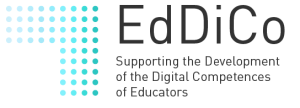5.1: Empowering Learners -> Accessibility and inclusion -> Expert attitudes
explorative attitude toward digital technologies and pedagogical strategies designed for learners’ in need of special support
explorative attitude toward digital technologies and pedagogical strategies designed for learners’ in need of special support
is aware that compensatory digital technologies can be used for learners in need of special support (e.g. learners with physical or mental constraints; learners with learning disorders) ensures that all students have access to the digital technologies he/she uses. employs digital technologies and strategies (e.g. assistive technologies) designed for learners’ in need of special support (e.g. learners with physical or mental constraints; learners with learning disorders, visually or hearing impaired learners)
knows digital pedagogical strategies that adapt to learners’ digital contexts (e.g. limited usage time, type of device available).
concern about accessibility and inclusion in digital education
is aware that digital technologies can hinder or improve accessibilityv does not yet implement digital technologies and pedagogical strategies to foster accessibility and inclusion
is aware of accessibility and inclusion issues in digital learning environments and the importance of ensuring equal access to the digital technologies used for all students.
commitment to ensure that the same level of criteria for recognition is applied across the institution and to (further) develop a recognition database within his/her institution
explains, creates, implements and continuously improves institutional procedures and tools for recognition, such as clearly defined and harmonized processes for recognition, recognition database, data standards and digital information exchange, information to learners about open learning and how it can be recognized, stakeholder involvement. shares and discusses experiences and developments with the relevant community
knows and improves the institutional guidelines and tools and the in the light of recent discussions and updates of the relevant principles and regulations for recognition of formal and non-formal learning
commitment to convince colleagues of the advantages of recognition. advocacy for transparent and easy-to-follow processes for recognition in his/her institution
Supporting the Development and Certification of the Digital Competences of Educators – EdDiCo
Project Ref: 2019-1-DE01-KA203-005070
This project has been funded with support from the European Commission. This website reflects the views only of the authors, and the Commission cannot be held responsible for any use which may be made of the information contained therein.

